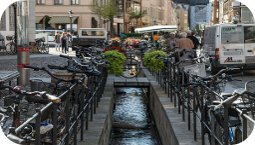Effects of an information workshop on the conservation of water resources in the optimization of the residential public service

DOI
https://doi.org/10.25267/Rev_educ_ambient_sostenibilidad.2020.v2.i2.2101Info
Abstract
Environmental education programs, assuming an intensive training of skills as the axis of solution in the face of scarce resources, have focused on the optimization of public services. In this sense, the objective of this work has been to observe the effects of an informative workshop in which the prevention and repair of leaks was promoted, as well as saving water through dosing and reuse. A quasi-experimental study was conducted with 316 intact subjects selected intentionally. The results show significant differences before and after the informative workshop. This is the case of the indicator of pluvial catchment that in a beginning was considered the reflective indicator of the factor, but that after the workshop it reduced its value. In contrast, the maintenance of hydraulic facilities revealed a domestic awareness of heritage conservation, although the segmentation of the information workshop is recommended to corroborate latent relationships between water optimization and heritage conservation.
Keywords
Downloads
License
Authors who are published in this journal agree to the following terms:
- Authors will retain their copyright and will grant the journal the right of first publication of their work, which will simultaneously be subject to the Creative Commons Acknowledgement License allowing third parties to share the paper as long as its author and its first publication in this journal are indicated.
- Authors may adopt other non-exclusive licensing arrangements for the distribution of the published version of the work (e.g. deposit in an institutional telematic archive) provided that the initial publication in this journal is indicated.
- Authors are allowed and encouraged to disseminate their work via the Internet (e.g. in institutional telematic archives or on their website) once the manuscript has been accepted, which can lead to interesting exchanges and increase citations of the published work. (See The Open Access Effect)
References
Ato, M., López, J., y Benavente, A. (2013). Un sistema de clasificación de los diseños en investigación en psicología. Anales de Psicología, 23(3), 1038-1059. https://www.redalyc.org/pdf/167/16728244043.pdf.
Colmenarejo, R. (2016). El agua ¿Derecho humano? Revista de Fomento Social, 71(1), 99-102. file:///C:/Users/UNAM/Downloads/Dialnet-Agua-5609247.pdf.
Corral, V., Tapia, C., Fraijo, B., Mireles, J., y Márquez, P. (2008). Orientación hacia la sustentabilidad como determinante de los estilos de vida sustentables: Un estudio con una muestra mexicana. Revista Mexicana de Psicología, 5(2), 313-327. https://www.redalyc.org/pdf/2430/243016308011.pdf.
Ferrando, P. J., y Anguiano, C. (2010). El análisis factorial como técnica de investigación psicológica. Papeles del Psicólogo, 3(1), 18-33. https://www.redalyc.org/articulo.oa?id=77812441003.
Gain, A., Giupponi, C., y Wada, Y. (2016). Measuring global water security towards sustainable development goals. Environmental Research Letters, 11(1), 1-14. https://iopscience.iop.org/article/10.1088/1748-9326/11/12/124015
Gamboa, G. (2015). Los objetivos del desarrollo sostenible. Una propuesta bioética. Persona y Bioética, 19(2), 175-181. https://www.redalyc.org/pdf/832/83242580001.pdf.
Kumar, B. (2014). Environmental education: The tool for sustainable development. Global Journal Multidisciplinary Studies, 3(10), 124-135.
Little, D. (2014). Defining sustainability in meaningful ways for education. Journal of Sustainability Education, 7, 1-19.
Maletic, M., Maletic, D., Dahlgaard, J. J., Dahlgaard-Park, S., y Gomiscek, B. (2016). Effect of sustainability-oriented innovation practices on the overall organizational performance: an empirical examination, Total Quality Management and Business Excellence, 27 (9-10), 1171-1190. https://core.ac.uk/download/pdf/192594679.pdf.
Manzano, A. P. (2017). Introducción a los modelos de ecuaciones estructurales. Investigación en Educación Médica, 7(25), 67-72. http://www.scielo.org.mx/pdf/iem/v7n25/2007-5057-iem-7-25-67.pdf.
Merino, C. (2016). Diferencias entre alfas de Cronbach, con muestras y partes pequeñas. Un programa VB. Anales de Psicología, 32(2), 587-588. https://www.redalyc.org/articulo.oa?id=16745250031.
Milana, M., Rasmussen, P., y Holford, J. (2014). Public policy and sustainability of adult education. Encyclopaideia, XVIII(40), 3-13.
Noga, J., y Wolbring, G. (2012). The economic and social benefits and the barriers of providing people with disabilities accessible clean water and sanitation. Sustainability, 4, 3023-3041. DOI: 10.3390/su4113023.
Sanahuja, J. A., y Tezanos, S. (2017). Del milenio a la sostenibilidad: retos y perspectivas de la agenda 2030 para el desarrollo sostenible. Política y Sociedad, 50(2), 533-555. http://dx.doi.org/10.5209/POSO.51926.
Valizadeh, N., Bijani., y Hayati, D. (2019). A comparative analysis of behavior theories towards farmers´ water conservation. International Journal of Agricultural Management and Development, 9(1), 1-10. http://ijamad.iaurasht.ac.ir/article_545944_4de15e816f5b7d0ec57de819a84d21f9.pdf.
Yazici, O. (2020). Awareness of hydrography courses students on protection freshwater resources. Review of International Geographical Education, 10(1), 97-119. http://www.rigeo.org/vol10no1/Number1Spring/RIGEO-V10-N1-5.pdf.





